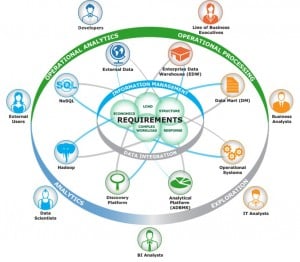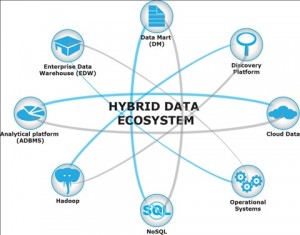Earlier today I presented findings from my recent EMA Radar for Workload Automation (WLA): Q1 2016 report. The recording for the webinar is now live here.
Q&A from EMA Radar for Workload Automation (WLA): Q1 2016
By Dan Twing on Mar 16, 2016 8:05:41 AM
Developing an Information Management Strategy Within the EMA Hybrid Data Ecosystem
By John Myers on Mar 13, 2015 9:24:56 AM
Enterprise Management Associates (EMA) has recognized that big data implementers and consumers rely on a variety of platforms to meet their big data requirements. These platforms include new data management technologies such as Hadoop, MongoDB, and Cassandra, but the collection also includes traditional SQL-based data management technologies supporting data warehouses and data marts; operational support systems such as customer relationship management (CRM) and enterprise resource planning (ERP); and cloud-based platforms. EMA refers to this collection of platforms as the Hybrid Data Ecosystem (HDE):
Return on Investment (ROI) of Data Science as a Service
By John Myers on Aug 18, 2014 10:31:56 AM
In skiing, the “black diamond” run or ski slope is often referred to as “high risk/high reward.” You receive lots of “reward” skiing the black diamond slopes, but you have a significant amount of “risk” associated with variable terrain, such as the presence of trees and the possibility of injury. However, the black diamond slopes are very fun to experience, and you can mitigate the risks with preparation, practice, and a really good skiing helmet.
Software Defined Storage: Why Customers Should Care – Part 1 of 2
By Torsten Volk on Feb 17, 2014 9:42:22 AM
Much marketing hype and heated discussions should be seen as excellent indicators for the fact that Software Defined Storage (SDS) is one of the hottest topics in today’s data center. Naturally, every vendor defines SDS based on their own product range, sometimes leaving customer out of the equation.
What Big Data Is Not
By John Myers on Dec 7, 2012 1:12:00 PM
Next week, EMA and 9sight will hold a webinar covering our Big Data research findings. Among our insights will be that Big Data has evolved. Moving forward, Big Data isn’t:




